
Killing baby Hitler is a thought experiment in ethics and theoretical physics which poses the question of using time travel to assassinate an infant Adolf Hitler. It presents an ethical dilemma in both the action and its consequences, as well as a temporal paradox in the logical consistency of time. Killing baby Hitler first became a literary trope of science fiction during World War II and has since been used to explore these ethical and metaphysical debates.
Ethical debates on the problem of killing baby Hitler can demonstrate the outlook of various moral philosophies: utilitarianism holds that killing baby Hitler is justified, as the potential benefits outweigh the potential costs; deontology holds that killing baby Hitler is unjustified, as infanticide is always wrong; and consequentialism may question what the consequences of killing baby Hitler might be, holding that the unforeseen future consequences of such an act make it difficult to judge its morality. It is also used to raise the question of nature versus nurture, whether changing the society that baby Hitler grew up in might be preferable to killing baby Hitler.
Metaphysical debates about the possibility of killing baby Hitler have been used to discuss different philosophies of time: the B-theory of time considers killing baby Hitler to be impossible due to its inherent temporal paradox, while theories of multiple time dimensions leave room for the past to be changed by killing baby Hitler.
Public debate around the question of killing baby Hitler reached its height in late 2015, after The New York Times published a poll asking its readers the question. Advocates of killing baby Hitler included Florida governor Jeb Bush and film actor Tom Hanks, while comedian Stephen Colbert and pundit Ben Shapiro were counted among the opponents of the policy.
